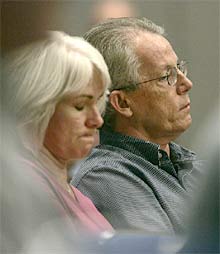|
Pleas for Pension Program
By Jennifer Vigil, Union Tribune
October 20, 2007

Assistant engineer Jack Canning, with wife Lisa at a pension program meeting yesterday, told San Diego pension board members: "Looking to me for more money will not be an option."
Retirement system hosts gathering to discuss who should pay to cover miscalculations of costly, controversial benefit.
In a city where politicians have taken to pointing fingers at each other daily, Jack Canning knows exactly where to place the blame for San Diego's pension mess – on every official involved with the system. Canning, an assistant engineer who has worked in the city's Development Services Department for 13 years, believes he owes his heart problems to the stress of worrying about the value of his benefits.
Canning, along with about 150 other workers, retirees and city officials, packed a San Diego Convention Center hall yesterday to discuss a pension program that retirement administrators admitted last month has added nearly $150 million to the fund's deficit.
That sum, about 15 percent of the system's $1 billion liability, can be attributed to former retirement officials miscalculating the cost of a benefit. The program allowed employees to purchase credits so they could count years they did not work as part of their pensions.
Canning, who spent $45,000 to obtain the maximum – five years – wondered if he will be asked to invest more to cover the full cost and questioned if there is anyone he can trust.
“What makes you think that I think you're right today?” he asked pension board members. “ . . . Looking to me for more money will not be an option.”
The San Diego City Employees' Retirement System held the special meeting to review options for handling the cost of the purchase-of-service program. Another is planned for Nov. 16.
The possibilities include asking employees to make up the difference or give up the extra years, seeking court intervention or simply absorbing the debt as part of the city's overall unfunded liability.
From 1997 to 2003, workers paid 15 percent to 26 percent of their annual salaries for each year of credit. Experts later determined those percentages were too low to cover the long-term costs of the added benefits, so they increased the share to 27 percent to 50 percent per year.
The change attracted a stampede to join the program before the less expensive rates expired. More than one-third of those who entered contracts to buy years did so in the months before the November 2003 shift to the higher rates. That tacked on $34 million to the fund deficit.
Councilwoman Donna Frye and City Attorney Michael Aguirre, who appeared at the meeting, have pushed for the nearly 6,000 workers in the now-shuttered program to pay the true costs if they are to enjoy the full benefits.
Aguirre, who has waged an unsuccessful legal battle to roll back two rounds of benefits increases, including the credit program, riled up the crowd immediately. He drew further catcalls when he accused employees of using “inside information to rig the system.”
Ann Smith, the labor attorney who led the team that defeated Aguirre in court, offered a simple response to pension board members' questions about whether they should take action: “The answer is no.”
Workers already have sacrificed because the city deducts more from their paychecks to help cover the pension shortfall, Smith said, adding that workers should not be blamed for 20 years of poor fiscal decisions by the city.
“You should tell them today, they should not worry anymore,” Smith said.
Yet they do, as 20 current and former workers who spoke at the meeting made clear. They complained they had paid thousands of dollars to gain the years of credits, some by cashing out portions of other retirement accounts, others by obtaining home equity loans as San Diego's real estate market boomed.
Lynn Swanson of the city's Retired Employees Association, said the uncertainty about pensions “strips our peace of mind and tarnishes our golden years.”
Delores Johnson, who left her secretarial position last month, said her credits boosted her monthly pension to $1,166, and she needs every bit of it.
“I do not want you to take anything from my miserable little pension,” Johnson said.
More
Information on US Social Security Issues
More Information on US Private Pension Issues
More Information on Trade Unions and Pension Issues
Copyright © Global Action on Aging
Terms of Use |
Privacy Policy | Contact
Us
|



